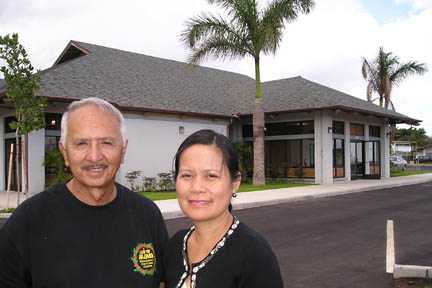
|
Maui Filipino center
is set to open today
The $21 million facility serves
as a tribute to those who helped
make Hawaii what it is
KAHULUI » An orphan at age 12, Pedro Enriques thought he was going to China when he stowed away on a ship from the Philippines.
But the ship went the other way, and he was put on the beach at Maliko Bay on Maui in 1908 after being discovered by the vessel's crew members.
"He went to work for several sugar companies," said his son, John Wayne Enriques, a retired chiropractor. "He spoke a little English, and eventually they made him a supervisor."
Enriques said the new Maui Filipino Community Center in Kahului will serve as a tribute to Filipino immigrants such as his father, who through hard work contributed to the economy and social fabric of Hawaii.
A public blessing and grand opening is scheduled at 4:30 p.m. today, followed by a $50-a-plate fund-raising dinner at the center. An open house is scheduled for 10:30 a.m. tomorrow, with free entertainment and food.
Enriques, whose group Binhi at Ani led the drive for the $21.1 million building, said the center, including an 8,000-square-foot hall, will be open for public use to all ethnic groups and offer a variety of activities, including after-school programs and social events.
The center is across the street from Maui Waena Intermediate School in Kahului, where there is a large population of Filipinos ranging from immigrants to those who have lived in Hawaii for several generations.
Norma Barroga, president of the Maui Filipino Community Council, said the Binhi group hopes to reinvigorate Filipino plantation celebrations, such as Dr. Jose Rizal Day on Dec. 30, honoring the hero of the Philippine independence movement against the Spanish.
Barroga said that during the Hawaii plantation era in the early 1900s, Filipinos celebrated Rizal Day, but have not been continuing the tradition, partially because there has not been a convenient place to gather to mark the occasion each year.
"Now, we have a place where we can celebrate these cultural events and important functions," she said.
Barroga said her late father-in-law Felipe Barroga Sr., who once worked as a sugar cane field employee, shared stories with her about the Filipino experience in Hawaii, including his memory of a labor strike in the 1930s.
"He said it was hard work," Barroga said. "They were paid $1 a day for 10 hours of work. He joined the strike."
The labor strike was unsuccessful, and he lost his house and job at a sugar plantation, she said.
He found work as a taxicab driver and also worked at Maui Electric Co., she said. Filipinos joined other ethnic groups in forming agricultural bargaining units under the ILWU in the 1940s and 1950s and played a key role in helping to organize successful strikes at sugar and pineapple plantations in Hawaii.
Binhi members said the development of the center was not easy.
Enriques, a former Maui County councilman, said the group started in 1985 and received a 2-acre donation of land from Alexander & Baldwin Inc. in 1989 and also financial support from individuals and the county, state and federal government.
But the development was stalled for four years after native Hawaiian burials were found on the property, forcing a redesign of the center.
Anyone wishing to purchase dinner tickets for today's event can contact Barroga on Maui, 242-6431.
[News] [Business] [Features] [Sports] [Editorial] [Do It Electric!]
[Classified Ads] [Search] [Subscribe] [Info] [Letter to Editor]
[Feedback]
